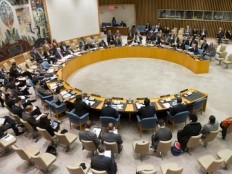|
||||||||||||||||||
| Download the revised decree and electoral calendar, published in the official journal |
|
|
Haiti - Politic : Reactions of members of the Security Council on the elections in Haiti 21/03/2013 10:02:46
Wednesday morning, before the Security Council, Nigel Fisher, Acting Special Representative of the Secretary-General and Interim Head of the United Nations Stabilization Mission in Haiti (Minustah), presented, before the Security Council, the Secretary-General’s latest report on the Mission, in this report, the Secretary-General reports on the political situation and the state of security in Haiti and returned to the issue of elections. The Secretary-General explained that "the conflict that took place between the political leaders of the three branches of the Haitian state has led to delays, that have disrupted the functioning of the system of governance and led the country into a political impasse extremely damaging," adding that "the holding of elections having been postponed, the Secretary-General urges the Haitian authorities to create a climate conducive to the holding of free elections in 2013, fair, credible and open to all," and asked that the three branches of government successfully complete the appointment of members of the College Transitional of Permanent Electoral Council (CTCEP). "The United Nations stands ready to support the upcoming elections and to work with the Haitian authorities over the coming three years to enable them progressively to as sume full responsibility for the management of the electoral process by 2016," we can read on the report. Nigel Fisher stated that "holding credible elections in 2013 [they should have taken place in November 2011] is fundamental to reinforce Haiti’s democratic institutions, strengthen the rule of law and respond to the urgent needs of Haiti’s citizens, such as employment and social protection [...] the President of Haiti is committed to creating, before Easter, the CTCEP. But it will be only a first step towards the holding of credible elections open to all," adding "Minustah urges political actors to cooperate more closely in order to allow the holding of elections before the end of the year, this implies that are better defined donor mandates and, to approve a law on donor activities and on the financing of political parties, and an agreement on the terms applicable to the Electoral Council." Reactions of members of the Security Council : Susan Rice representative of the United States declared "As the Council had noted, holding free and fair elections by the end of 2013 was critical. The absence of such elections impeded social and economic development in Haiti. While there had been recent steps forward on the political front, the United States looked forward to the scheduling of those long-overdue elections. That would send a signal to the international community that Haiti was committed to ensuring peace and development in the country." Maria Cristina Perceval of Argentina, insisted on the fact that "the holding of fair and credible elections in 2013 was vital to building Haiti’s capacity and rebuilding the rule of law." Mr. Luis Fernando Carrera Castro, Minister of Foreign Affairs of Guatemala declared that "there was reason for concern about the persistent uncertainty around the pending elections — 16 months overdue — against such a setting, the fundamental immediate priority, he said, was holding local, municipal and legislative elections, as continuing to put off those polls could jeopardize rule of law in the country. Guatemala echoed the calls of the international community that fair and transparent elections were needed in Haiti as soon as possible." Mrs. Sylvie Lucas of Luxembourg stated that the holding of elections, originally set for 2012, was "absolutely necessary" and she called urgently for Haiti to spare no effort in creating the conditions for holding free, fair and credible elections. It also was crucial to finalize the creation of a transitional electoral council. The representative of Morocco, M. Lotfi Bouchaara, hoped that the elections could be organized quickly. Mr. Wang Min of the Republic of China has also emphasized on the need to ensure the organization of elections fairs, just and credible in 2013. For Philip Parham of the United Kingdom political appointments, including for the permanent electoral council, must be completed quickly. Mr. Gérard Araud of France declared '"local and partial legislative elections had been too long delayed. Free, fair and credible elections must take place this year and the members of a transitional electoral college must be appointed," moreover he voiced concern about reports of disputed nominations. Mrs. Philippa King Jaane of Australia shared the Secretary-General’s concern over the ongoing political stalemate, including over creation of the Provisional Electoral Council. Credible, free and fair elections in 2013 were critical for Haiti’s recovery, reconstruction and development. She urged progress in appointing members of the Provisional Electoral Council so that partial legislative, municipal and local elections could be organized, followed by the Council’s creation. Holding elections was crucial for attracting much-needed private investment. Mr. Vitaly Churkin, of the Russian Federation said Haiti’s political process was "shaky", with rising political rhetoric that had not eliminated differences between the executive power and Parliament. Partial parliamentary and municipal elections should be held this year, with the United Nations supporting that process, and all political forces showing restraint and resolving disputes only through legal mechanisms. Mr. Fritzner Gaspard representative of Haiti declared that his delegation took note of the concerns expressed about the delay in the execution of the electoral calendar linked to the organization of parliamentary by-elections, municipal and local. The delegation reaffirmed at the same time, the Government's commitment to work towards the holding of these elections, as soon as possible and in the best conditions of honesty and transparency, and in strict compliance with democratic standards. On behalf of the Group of Friends of Haiti, (Argentina, Brazil, Canada, Chile, Colombia, France, Guatemala, Peru, United States and Uruguay) Mr. José Luis Cancela of Uruguay stressed the importance of the timely realization of free and fair partial legislative, municipal and local elections, which constituted an essential and urgent step to lasting stability, recovery and development in that country. The effective establishment of the Electoral Council would be a major milestone in that process, he said, calling for the prompt appointment of members of the Transitional College of the Permanent Electoral Council. M. Octavio Errázuriz of Chile stated, however, that it is necessary to achieve political dialogue between the different branches of power of the state. He urged the Haitian authorities to take measures conducive to the achievement of consensus, particularly by organizing free and fair elections. He called in this regard to the creation of the Electoral Council. Mr. González de Linares Palou of Spain declared that local elections, as well as the election of a third of the Senate, were still pending as a result of the incapacity of Haitian political actors to constitute the Permanent Electoral Council provided for in the 1987 Constitution. In addition, the compromise solution proposed by Haitian President Michel Joseph Martelly a few months ago to establish a transitory council had also not been implemented because of problems in the designation of some of the council’s members. As the Security Council had stated, the outstanding elections should be celebrated in 2013, he added. Mr. Thomas Mayr-Harting, Head of the Delegation of the European Union eiterated calls to hold elections as soon as possible and noted that the European Union was ready to contribute the necessary finances to support capacity-building in the political sphere. For Mr. Guillermo E. Rishchynski of Canada, the continued stalemate in organizing the long overdue senatorial and municipal elections raised serious questions about the capacity of Haiti’s democratic institutions. The elections must be held in 2013 and as soon as possible. "By encouraging the creation of a legitimate and credible electoral council that could organize these elections, the Haitian leaders have the opportunity to renew their commitment and demonstrate the respect due to the principles of democracy [...] If elections are not held in 2013, it will be increasingly difficult for the international community to accept the apology made by the authorities of Haiti and delays." Mr. Augusto Thornberry of Peru also stressed the need for elections that take place in a transparent and democratic manner and credible. Responding to statements made by delegations, Nigel Fisher recognized the need for the establishment of the conditions necessary for the proper organization of future legislative and local elections. He noted that the delegations emphasized on the political fragility of Haiti and the need to achieve an inclusive political dialogue. HL/ HaitiLibre
|
|
|
Why HaitiLibre ? |
Contact us |
Français
Copyright © 2010 - 2026 Haitilibre.com |





